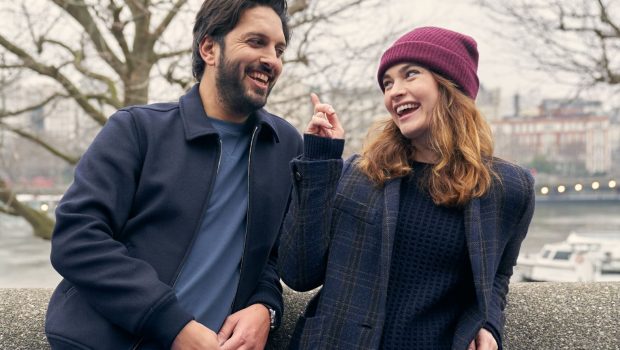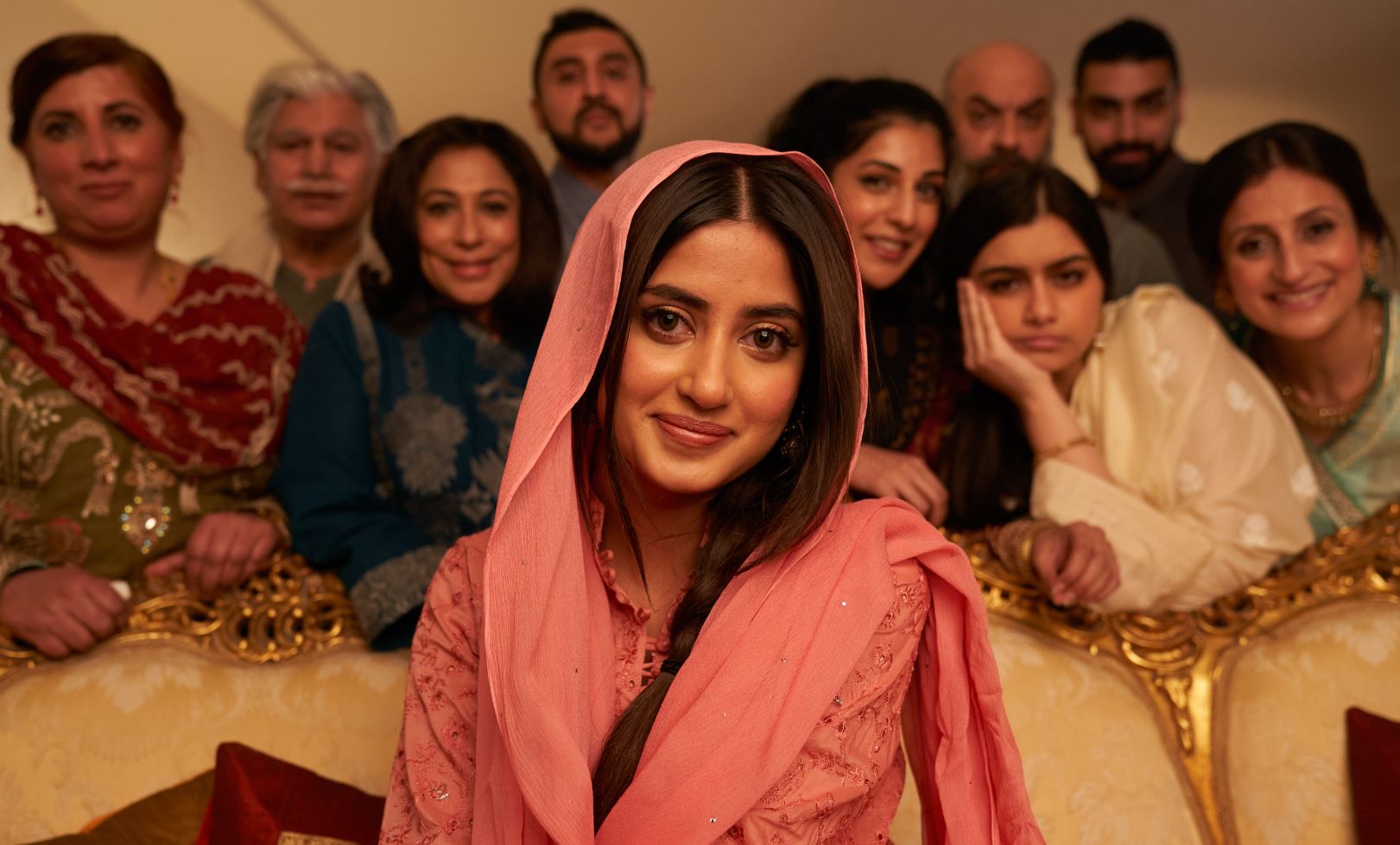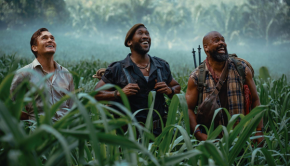What’s Love Got to Do With It? – Film Review
Reviewed by Damien Straker on the 5th of February 2023
StudioCanal presents a film by Shekhar Kapur
Written by Jemima Khan
Produced by Nicky Kentish Barnes, Jemima Khan, Tim Bevan, and Eric Fellner
Starring Lily James, Shazad Latif, Shabana Azmi, Emma Thompson, Sajal Aly, Oliver Chris, Asim Chaudhry, Jeff Mirza, Alice Orr-Ewing, and Rahat Fateh Ali Khan
Cinematography Remi Adefarasin
Edited by Guy Bensley and Nick Moore
Music by Nitin Sawhney
Rating: M
Running Time: 110 minutes
Release Date: the 26th of January 2023
Images: StudioCanal Australia
What’s Love Got to Do with It? is a shockingly tired, by-the-numbers romantic comedy that is not as progressive as it suggests. After enduring its overly manufactured screenplay, it recalls a fun quote a from the late film critic Roger Ebert. He once asked, why do you buy a movie ticket? To get the ending you’re expecting? This is a fascinating question around audience’s expectations. It asks whether we are content knowing exactly how a film will resolve itself or whether we are willing to have our expectations challenged and upended. Sadly, even those seeking frothy, light entertainment would meet What’s Love’s shamelessly derivative finale with a collective eyeroll. While the story is redressed in multicultural attire and makes safe, agreeable points about arranged marriages and interracial relationships, we have seen this same film time and again. The same derivative outline of the story has been punched out once more. Diversity is always a welcome addition to the formula. However, even with a wider cultural perspective at play, the creative stagnancy that cripples this genre remains.
Journalist and producer Jemima Khan makes her screenwriting debut and provides this lame comedy with an overly predictable narrative. A thirty-year-old documentary filmmaker named Zoe (Lily James) has been unlucky in love. She has spent countless hours meeting unsuitable men on dating apps while being pressed by her eccentric mother, Cath (Emma Thompson), to find someone to marry. Zoe’s childhood friend, Kaz (Shazad Latif), a doctor, is also looking for love. However, his family, who are Muslims and neighbours to Cath, have strict plans for their son. Kaz’s parents (Shabana Azmi and Jeff Mirza) want him to undertake an arranged marriage with a young woman, Maymouna (Sajal Ali), from Pakistan. Kaz talks to her over Skype and agrees to marry her in Lahore. Zoe is seeking new documentary work and pleads with Kaz to film his journey. Once he agrees, he and his family, along with Zoe and Cath, travel overseas for the wedding. However, it is clear Maymouna is deeply unhappy with the arrangement. Her discomfort pressures Kaz to rethink their future, including the possibility of his new bride moving to London with him. Meanwhile, Zoe’s mother introduces her to James (Oliver Chris), a well-meaning but bland vet. Zoe and James enter a meek relationship, but the question is whether both couples will stay with their respective partners to satisfy their parents.
While no one is expecting avant-garde filmmaking from the producers of Love Actually (2003), What’s Love is as dully constructed as its join-the-dots narrative. Some visual distinction from director Shekhar Kapur might have sparked proceedings. The rust shows in his first feature since Elizabeth: The Golden Age (2007). Despite shifting locations from London to Lahore, the photography is blasé and unmemorable, and the locations have been completely scrubbed of any visible grit. The story’s ‘darkest’, most ‘shocking’, ‘horrific’ sequence involves Zoe reading a story to her sister’s children about a wolf. Kapur juxtaposes Zoe’s narration with her meeting someone at a nightclub and going home with him! Devastating. There are scant traces of flair found during a large wedding party. Thankfully, the dancers add a touch of colour. Otherwise, the scenes in Lahore completely forgo atmosphere or danger. For example, Zoe is often allowed to explore various streets without wearing a hijab. The lack of detail is odd since Jemima Khan lived in Pakistan. Instead, the film limps from one predictable point to another, which sees the pace sag and laughs depreciate. Kapur also moves the tone from light, superfluous fun and into a self-serious, ‘hug-it-out’ message movie. To be fair, these problems arise not just from the stale direction but the film’s poorly conceived screenplay.
The way the film postures as being a diverse, inclusive rom-com quickly proves increasingly cynical. For example, there are pair of oily executives who stifle Zoe’s creativity by telling her they do not want overly dark projects. We are meant to laugh at these narrowminded fools who obstruct her documentary career. Truthfully, this film is no better. What’s Love might have more representation than what the genre usually affords but the feat diminishes upon realising how derivative it is. The ending in particular reveals Kapur’s stale thematic intentions. Despite heat regarding arranged marriages, the story still dramatises (for want of a better word), whether a bubbly white woman with a quirky name will find a man. They even made the poor fellow a handsome doctor! The screenplay does nothing to transcend the cliché endpoint. The only interesting question Jemima Khan poses is whether some will stay in tepid relationships to satisfy other people’s expectations. Zoe’s sister is faced with a dilemma around loyalty and throughout the story Maymouna expresses her own discontent. Yet the film is coy about her perspective. It keeps her distanced, which makes a belated revelation about her personal life rushed. There was a funny, romantic story to be told about her moving to London. Otherwise, the film hovers over scenes, characters, and ideas before briskly discarding them. There is an underexplored subplot involving Kaz’s sister being banished from the family because her husband is white. The conflict is resolved in so glibly it does not strike any emotional notes. Similarly, James’ bond with Zoe hastily ends before exploring the couple’s emotional disparity. There are simply too many trimmings outside of the arranged marriage to properly explore its characters with depth.
The story’s clichés are a disservice to what should have been a fun romp guided by an inspired cast. Instead, the actors must overcome scenes of third-rate material, which includes but is not limited to bad dates, betrayals via text, a breakup, more breakups, family reunions, and finally some good old parental advice. At best, Kaz’s family and a character named Mo the Matchmaker offer funny moments before the laughs recede and the mood grows dull, serious, and predictable. Fortunately, Lily James’ disarming, energetic presence makes her far from an unlikeable lead. It is a pity the film offers her no unique traits to transcend Zoe’s cliché archetype of a thirty-year-old finding herself. Though apparently, she is such a gifted auteur she only needs one camera, no crew, to shoot a documentary across multiple countries. Luckily, James finds solid support in Shazad Latif. He plays Kazim as a sensible leading man who is visibly conflicted by the arrangement. Sajal Ali also effectively uses her eyes to show how uncomfortable Maymouna is with the process. Shabana Azmi and Jeff Mirza as Kaz’s parents offer some good laughs but are mostly treated like a pair of underwritten comedy sketches. Still, it is very funny when Kazim and Maymouna are on a date and his whole family books an entire row in the cinema to watch them. Sadly, Shekhar Kapur permits Emma Thompson to overact when there was potential for a more nuanced character in Cath. Largely, the derivative, undercooked screenplay stops these talented actors from reaching their full comedic potential.
Despite some infrequent laughs in the first half, the film marks a huge disappointment. It is marred by uninspired direction and assemblage that fails to counter its cliches with unique images and arresting visuals. Meanwhile, despite posturing as being inclusive and diverse, Jemima Khan’s screenplay rehashes the same tired plotlines that have exhausted the romantic comedy genre. By sticking too closely to familiar beats, she robs the film of a unique storyline. It also means the actors cannot embody their characters in ways that transcends some overly familiar archetypes. The cast is not at fault though given their efforts to enliven proceedings. The blame is with the producers whose sneaky ploy has been to make their tired, formulaic script appear more modern than it is. What’s love got to do with it? The bean counters and marketers who engineered this cynical exercise probably asked themselves the same question.
Summary: A shockingly tired, by-the-numbers romantic comedy that is not as progressive as it suggests.








